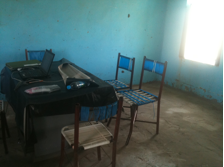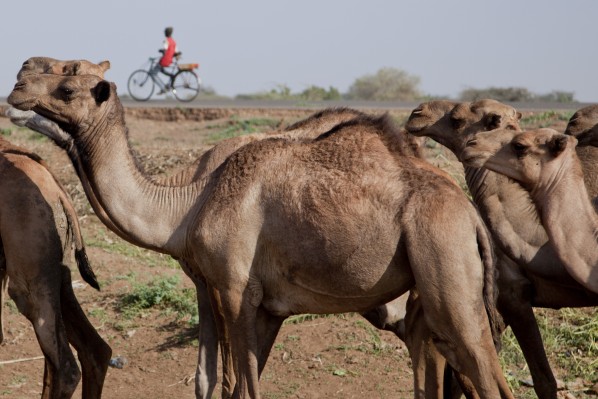In our effort to reach the most vulnerable refugees like the daughter described in this post, RefugePoint often works in difficult environments across Africa. This year in Dadaab refugee camp, there were repeated bomb attacks while in Cairo mass protests routinely affected local travel and staff security. In some countries, RefugePoint officers travel as far as five hours a day to interview refugees for resettlement.
In Sudan, for example, the commute to one refugee camp from the eastern provincial capital of Kassala is a 2½-hour journey one-way through rugged, sand swept terrain. Vehicles share the dusty road with grazing camels and goats, and a smattering of signs written in Mandarin and Arabic indicate a dam construction site on the way.
On one recent visit mission, the temperature inches past 100 degrees at 11am when our officer finally arrives at the camp. Her assignment for the day includes conducting five interviews over the course of five hours. This is twice the typical amount for a protection officer, but the long journey motivates the extra effort.
Inside the officer’s first file for the day, she finds faded documents dating back nine years for one Eritrean family waiting outside. The path this family has travelled has also been long and arduous. She thumbs through the scribbled notes, computer printouts, and photocopied documents, attempting to piece together the family’s background before inviting them into the office.
In one black and white photograph, four relatives sit together on a bench. The man holds up a sign indicating his family’s case number. To his right are his wife and oldest daughter, both draped in floral print fabric with only their faces and forearms exposed. A much younger daughter pictured on his left dresses differently than her older sister. She wears a white dress with puffy sleeves and lace. Although the file notes that the family is Christian, women and girls past the age of puberty in Sudan are required to abide by a strict Muslim dress code.
In the next photograph in the file, there are only three people pictured. An attached death certificate reveals how the mother died from medical complications between interviews. Perhaps if resettled sooner, she would still be alive.

When called from the waiting area into the sparse room, only the father and youngest daughter enter. The pair barely resembles the people in the first photo from nine years ago. The girl is now fifteen and she wears a long black robe, accented by a vibrant orange headscarf held perfectly in place by a silver pin.
The father looks tired and he explains that things have been difficult since his wife passed away. He has gone blind in one eye as a result of beatings in the camp and he is slowly loosing vision in the other. He has also lost another loved one. His oldest daughter disappeared after rumors began to circulate in the camp that men were plotting to marry her without her consent. He does not know where she is and he worries for her safety.
Now he is fearful for his remaining daughter. Similar rumors have prompted him to keep her near him at all times and he views resettlement as her only hope for protection. Our officer completes the interview and as the pair departs, she silently hopes to see them together again instead of finding a solo portrait stapled to the inside of their file.
